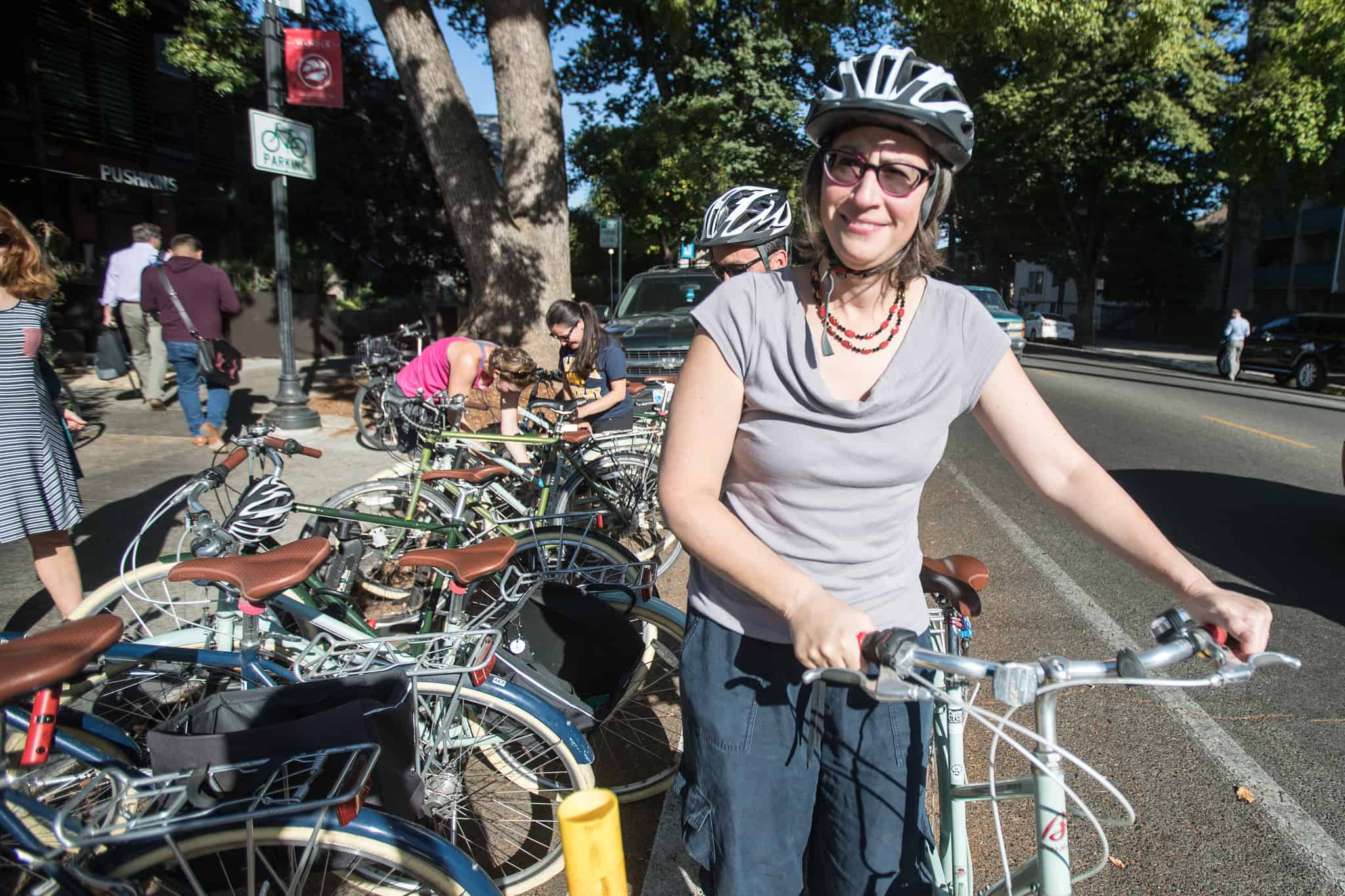CalBike’s Best and Worst of 2020
What can you say about 2020? It has been the most challenging, excruciating, frustrating, endless year that most of us have experienced. Along the way, there have been some ridiculous fails as well as some significant steps forward toward reclaiming streets for people in 2020.
Here are CalBike’s best and worst of 2020.
Best emergency repurposing of street space for safety: Slow Streets
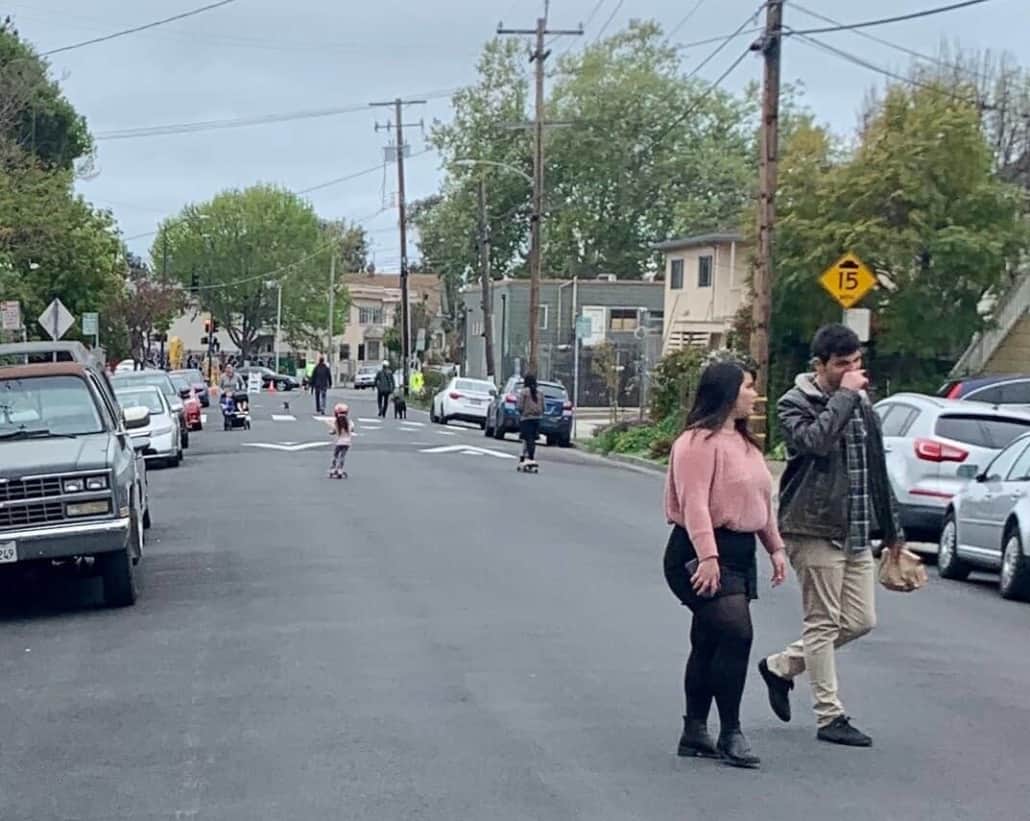
Note: the couple in the photo are sheltering in place together. Don’t freak out! Photo courtesy of Dave Campbell
The best antidote to sitting at home worrying about the pandemic is to get outside and get some exercise. Slow Streets turned neighborhood streets into safe zones for kids and adults to play while keeping safely socially distanced. They also served as crucial connections for essential workers to commute safely by bike. Californians rediscovered how joyful their neighborhoods could be once speeding cars were taken out of the equation, and we suspect they will not want to go back to normal.
Best emergency repurposing of street space for commerce: Parklets for outdoor dining
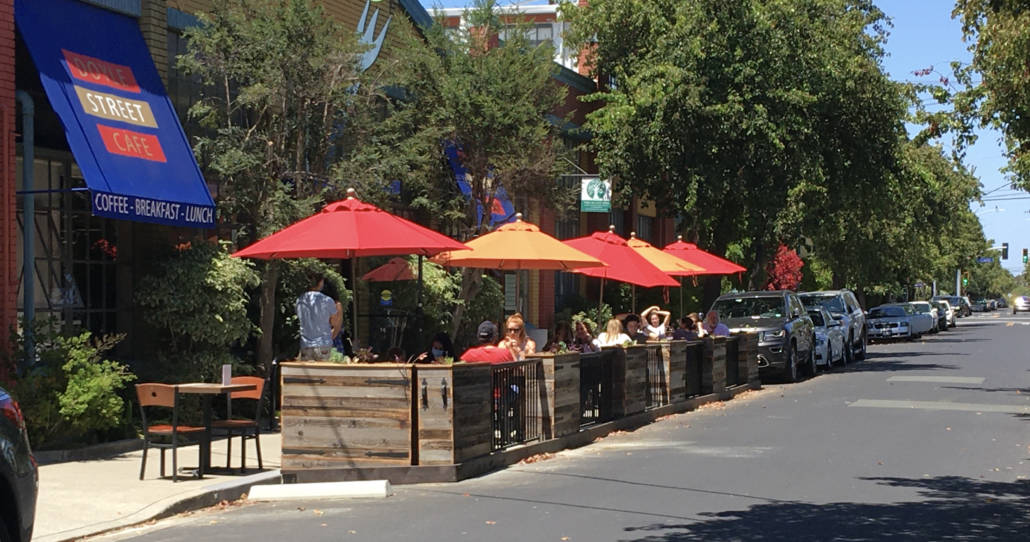
Why didn’t we think of this years ago? Oh yeah, we did, but business owners screamed about losing a couple of parking spaces. Outdoor dining brings life to our shared spaces, making them safer and more fun. It creates jobs and generates local tax revenue. We hope everyone gets it now: street space is far too valuable to be used for car storage next to every sidewalk.
Worst official grievance about pandemic street changes: San Francisco CEQA appeals of Slow Streets
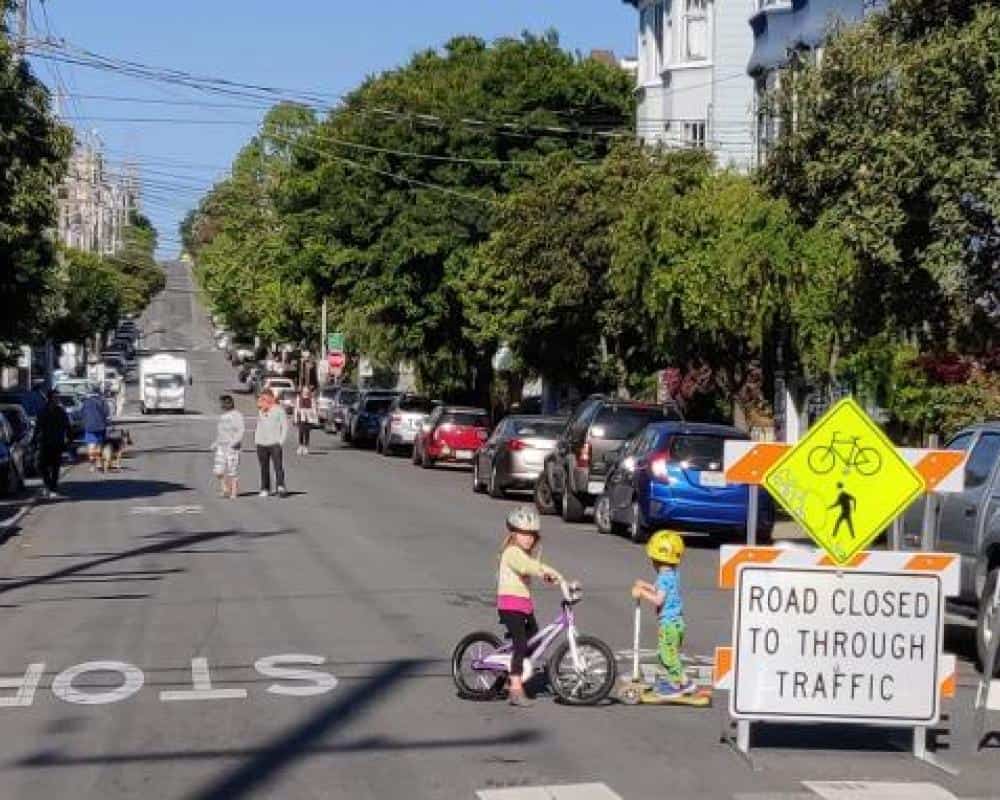
SF Slow Streets photo by SFMTA.
San Francisco’s pro-automobile advocates, the Coalition for Adequate Review, played the role of the Grinch and Ebenezer Scrooge rolled into one. They filed to stop San Francisco’s Slow Streets until it received a thorough environmental review. Their challenges were ultimately rejected by the SF Board of Supervisors, but they tied up staff time and held up the implementation of San Francisco’s wildly successful program. Bah humbug! Fortunately, this kind of challenge won’t be possible in 2021, thanks to the next award winner.
Best emergency legislative response to avoid unnecessary delays in good transportation projects: SB 288
For the next two years, officials who want to build a bikeway, convert a traffic lane to transit-only, or construct other specific types of bike, ped, and transit infrastructure, can do so without unnecessary delays like the one that held up San Francisco’s Slow Streets. Introduced by Senator Scott Wiener, Senate Bill 288 eliminated CEQA requirements for bike plans and other transit projects, including bus lanes, and added some easy but important requirements for engagement with disadvantaged communities. This forward-thinking law will make it faster and easier to build bikeways. Yay!
Worst unofficial grievance about pandemic street changes: a grave marker for a parking space
Someone isn't happy about traffic calming accommodations for bike & ped safety. pic.twitter.com/1a0tuSipOQ
— San Diego:Dialed In (@sddialedin) October 30, 2020
In a year when hundreds of thousands of people have died from a deadly virus, this grave marker for a San Diego parking space, removed to make the intersection safer for bikes and pedestrians, is beyond bad taste. ‘Nuff said.
Best policy initiative to address the need to rapidly change our streets: Quick-Build
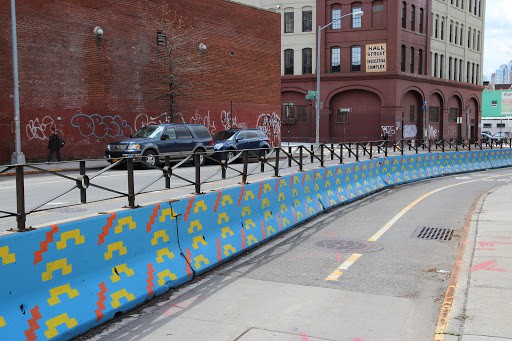
Photo courtesy of Street Plans Collective.
Quick-build design wasn’t invented in 2020, but it came into its own this year. From Paris and Milan to New York and San Francisco, cities used the quick-build ethos to reallocate public space for biking and walking. The Quick-Build method brings safety to our streets quickly and affordably, while also making for more effective and equitable outreach.
Best video featuring a bike ride (musical): I Went on a Date with a Polar Bear
CalBike’s multi-talented Development Director, Jenn Guitart, spent some of her free time during the pandemic making videos of her original songs. Her music video, “I Went on a Date with a Polar Bear and this Is What Happened” is a delightful expression of Jenn’s (and CalBike’s) deepest desires for officials and the public to understand that reducing car use (and increasing bike use!) is the best response to the existential challenge of climate change.
Best video featuring a bike ride (non-musical): Joe Biden on a bike
President-elect Joe Biden enjoying a bike ride with his wife, Dr. Jill Biden, is just one of many reasons to hope that 2021 will be better than 2020.
Best new protected bikeway: Walnut Avenue in Fremont
A lot of non-COVID-related projects got put on hold in 2020. But Fremont was able to finish the Walnut Avenue Bikeway, which features a raised cycle track, a properly protected intersection, and connections to major destinations, including BART.
Honorable mention: Ocean Avenue in Santa Monica. Santa Monica stepped up in response to the pandemic and added protected bike lanes on Ocean Avenue to bridge a gap in the city’s low-stress network. Bonus points for fast action!

Worst award-winning bikeway: North Fremont protected bike lanes, Monterey
Remember the last time you were driving in your car, and the street just ended because the city didn’t have money to build a fully connected street grid? And then the public works department asked you to be patient and told you to be grateful for incremental progress, even though the road has no useful function?
Oh, wait – that NEVER happens. Yet, the City of Monterey celebrated the completion of a 4-block protected bike lane on North Fremont Street that doesn’t connect to anything. And Caltrans thought this “bike lane to nowhere” merited an Excellence in Transportation Award. Well done, everyone. Thank you for reminding us how not to build bike infrastructure.
Best new organizational mascot: Cal the Cat
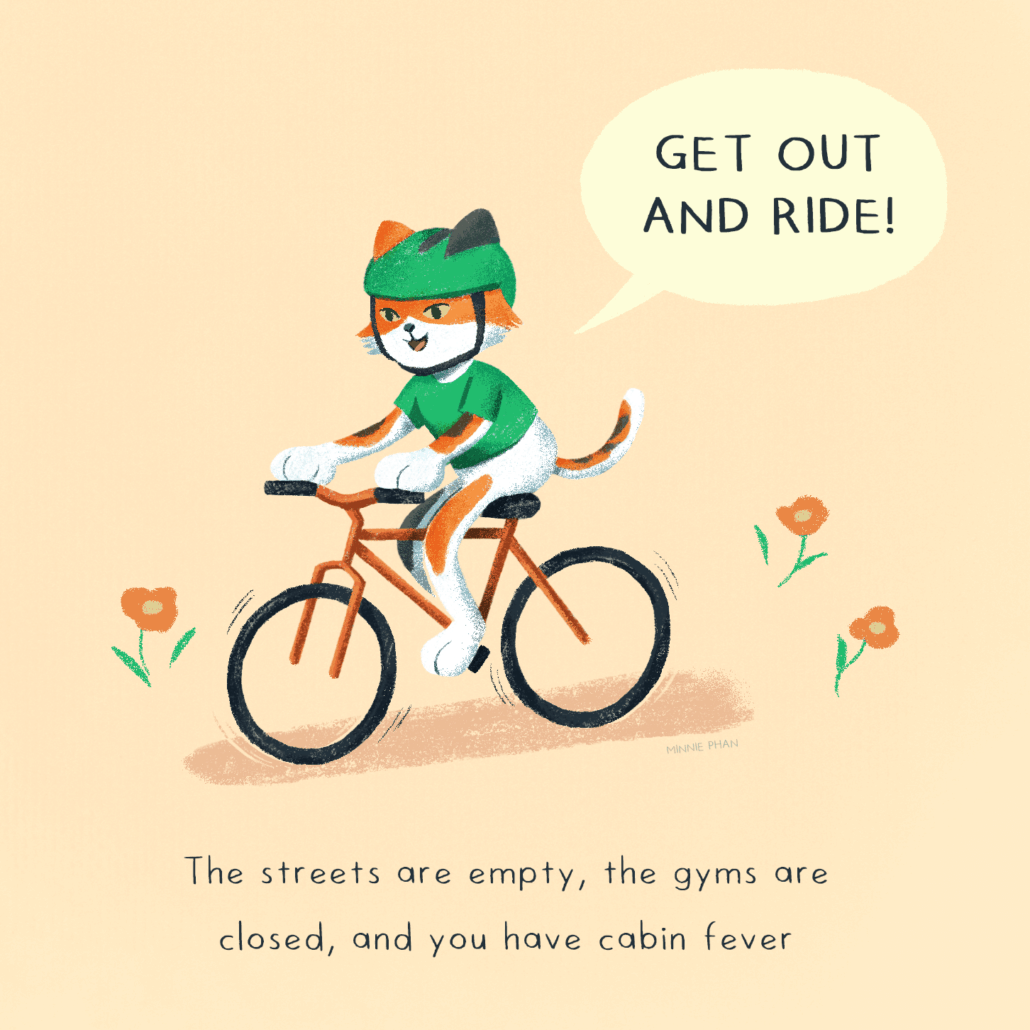
Talented artist (and former CalBike Development Associate) Minnie Phan created an illustrated mascot for CalBike that has a message for every season. Say ‘hi’ to Cal the Cat. They love you!
Best local election result: Nithya Raman unseats an incumbent on the Los Angeles City Council

CalBike made an exception to its focus on statewide races to help swing a seat on L.A.’s powerful City Council. Unlike the incumbent she ousted, Nithya Raman brings a powerful progressive voice to represent her district. With her background as an urban planner and her bike-friendly bona fides, we and the many Los Angeles social justice and bike advocates that helped get her elected have high hopes that we’ll be seeing more bikeable infrastructure in L.A. soon.
Of course, Raman is only one of several bike supporters elected this November. We’re excited to work with all the new members of the California Senate and Assembly next year.
Best new transportation funding source in California: Clean Mobility Options Grants
It’s a small sum — just $20 million — but this California program is a great use of California’s Greenhouse Gas Reduction Fund. It supports underserved communities with transportation options that do not rely on the inherently inequitable strategy of support for the private automobile. The program offered its first round of grants and will be followed soon by implementation grants to support electric shuttles, bike share and scooter sharing systems.
Looking ahead: Bike share and scooter share, as currently provided, do not serve Californians who need it most. The Clean Mobility Options for Disadvantaged Communities program is a model that can lead to the provision of shared micromobility on the same terms as public transit: ubiquitous and affordable.
Worst 1950s transportation project in 2020: Bakersfield’s new highway through a razed residential neighborhood
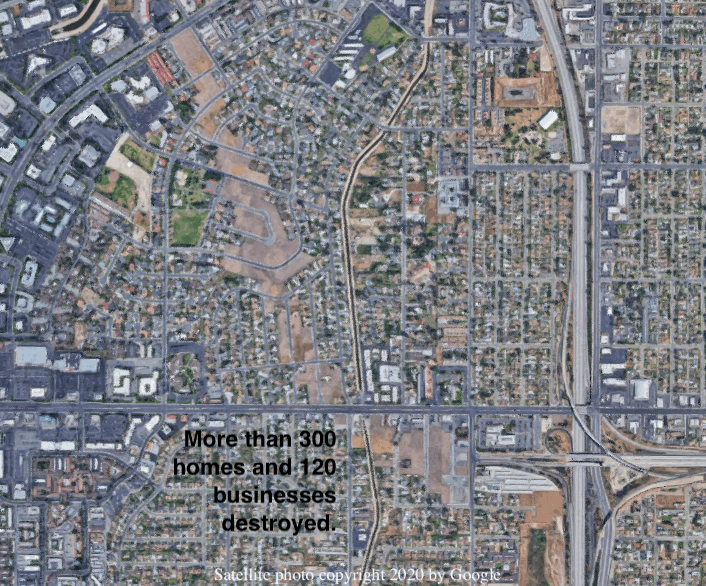
If you thought neighborhood-killing freeway projects were a thing of the past, think again. The project directly displaced 300 homes and 120 businesses and is set to devalue and endanger thousands of residents of the currently quiet but soon-to-be imperiled neighborhood of Westpark.
Looking ahead: Caltrans officials are not unaware of the racist and inequitable impact of their highway projects. Earlier this year Director Toks Omishakin directed the entire staff to watch the documentary Divided Highways about this country’s history of using freeway projects to destroy and divide (usually Black and poor) urban communities. That gives us hope for 2021 and beyond.
Worst Caltrans project with a happy ending: rumble strips on Highways 120, 108, and 49
It’s an old story when Caltrans completes a project with no consideration for users who aren’t in vehicles. But it’s news when the agency recognizes the problem, reverses course, and corrects the problem. In 2020, Caltrans did this not once, but twice.
The first instance was a project on Highways 120, 108, and 49 in Tuolomne and Mariposa counties. The shoulders of these state routes provided safe space to ride for the area’s many bicyclists. That is, until Caltrans installed rumble strips, obliterating the bike space. In a welcome turnaround, Caltrans took riders’ complaints to heart and removed the rumble strips so that bikes can ride free again.
Honorable Mention: Highway 67 in San Diego County suffered a similar fate with rumble strips. And again, after bicycle safety advocates brought this grave error it to the agency’s attention, they fixed it.
Looking ahead: As part of our (Caltrans-funded) project to promote bike tourism in five counties in the northern San Joaquin County and Sierra foothills, we plan to develop a process for statewide adoption that will prevent these mistakes in the first place.
Best Caltrans pivot: 2020 SHOPP funding
Caltrans’ second course-correction deserves its own award.
As you know, it makes eminent sense that Caltrans includes funding for safety upgrades for bike riders and pedestrians in every repair and repavement project. At the beginning of 2020, Director Omishakin recognized the shortfalls in its proposals for 2020 SHOPP funding and in an unprecedented request, asked the California Transportation Commission to delay funding until Caltrans could identify specific improvements and reallocate $100 million for bike and pedestrian infrastructure.
Looking ahead: CalBike is working with Caltrans to be more proactive about the next SHOPP and include bike and pedestrian projects from the beginning. We hope to have more Caltrans success stories to celebrate in 2021.
Luckiest timing of a bike event around the pandemic: California Bicycle Summit

CalBike hosts the California Bicycle Summit every two years. Our last Summit was held in Los Angeles, in person (remember what that was like?), in October 2019. We are hopeful that the restrictions on gathering will be lifted by this October, and we’ll hold our 2021 Summit, as scheduled, in October, in Oakland. Mark your calendars and we’ll see you there!
Best decision by Assembly Speaker Anthony Rendon
It was well known in the California Legislature that progressive transportation reform — complete streets, lower speed limits, equitable funding priorities — faced a prohibitive roadblock in the Assembly Transportation Committee. Its Chair, who enjoys inordinate power thanks to the rules of the legislature, deferred to the oil lobby and the California Highway Patrol instead of environmental groups and safety advocates. After years of complaining, Assembly Speaker Anthony Rendon finally did something to remove the roadblock, replacing the Chair with sustainable transportation advocate Laura Friedman. Thank you Speaker Rendon.
